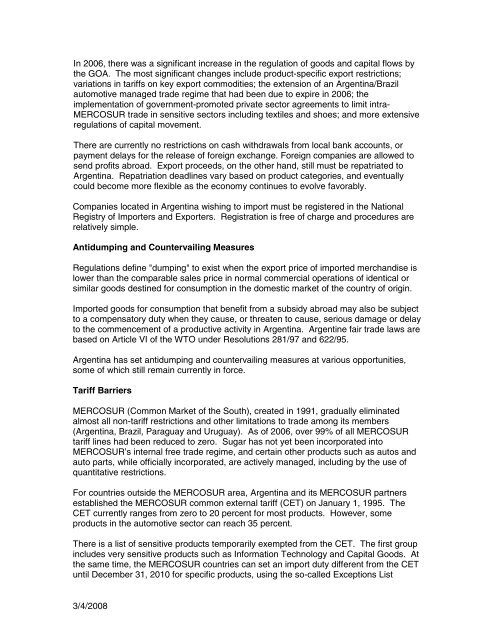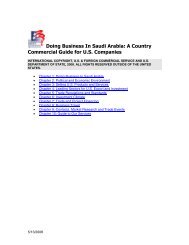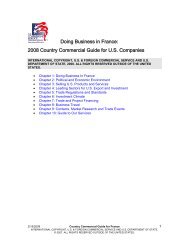You also want an ePaper? Increase the reach of your titles
YUMPU automatically turns print PDFs into web optimized ePapers that Google loves.
<strong>In</strong> 2006, there was a significant increase in the regulation of goods and capital flows by<br />
the GOA. The most significant changes include product-specific export restrictions;<br />
variations in tariffs on key export commodities; the extension of an <strong>Argentina</strong>/Brazil<br />
automotive managed trade regime that had been due to expire in 2006; the<br />
implementation of government-promoted private sector agreements to limit intra-<br />
MERCOSUR trade in sensitive sectors including textiles and shoes; and more extensive<br />
regulations of capital movement.<br />
There are currently no restrictions on cash withdrawals from local bank accounts, or<br />
payment delays for the release of foreign exchange. Foreign companies are allowed to<br />
send profits abroad. Export proceeds, on the other hand, still must be repatriated to<br />
<strong>Argentina</strong>. Repatriation deadlines vary based on product categories, and eventually<br />
could become more flexible as the economy continues to evolve favorably.<br />
Companies located in <strong>Argentina</strong> wishing to import must be registered in the National<br />
Registry of Importers and Exporters. Registration is free of charge and procedures are<br />
relatively simple.<br />
Antidumping and Countervailing Measures<br />
Regulations define "dumping" to exist when the export price of imported merchandise is<br />
lower than the comparable sales price in normal commercial operations of identical or<br />
similar goods destined for consumption in the domestic market of the country of origin.<br />
Imported goods for consumption that benefit from a subsidy abroad may also be subject<br />
to a compensatory duty when they cause, or threaten to cause, serious damage or delay<br />
to the commencement of a productive activity in <strong>Argentina</strong>. Argentine fair trade laws are<br />
based on Article VI of the WTO under Resolutions 281/97 and 622/95.<br />
<strong>Argentina</strong> has set antidumping and countervailing measures at various opportunities,<br />
some of which still remain currently in force.<br />
Tariff Barriers<br />
MERCOSUR (Common Market of the South), created in 1991, gradually eliminated<br />
almost all non-tariff restrictions and other limitations to trade among its members<br />
(<strong>Argentina</strong>, Brazil, Paraguay and Uruguay). As of 2006, over 99% of all MERCOSUR<br />
tariff lines had been reduced to zero. Sugar has not yet been incorporated into<br />
MERCOSUR’s internal free trade regime, and certain other products such as autos and<br />
auto parts, while officially incorporated, are actively managed, including by the use of<br />
quantitative restrictions.<br />
For countries outside the MERCOSUR area, <strong>Argentina</strong> and its MERCOSUR partners<br />
established the MERCOSUR common external tariff (CET) on January 1, 1995. The<br />
CET currently ranges from zero to 20 percent for most products. However, some<br />
products in the automotive sector can reach 35 percent.<br />
There is a list of sensitive products temporarily exempted from the CET. The first group<br />
includes very sensitive products such as <strong>In</strong>formation Technology and Capital Goods. At<br />
the same time, the MERCOSUR countries can set an import duty different from the CET<br />
until December 31, 2010 for specific products, using the so-called Exceptions List<br />
3/4/2008












